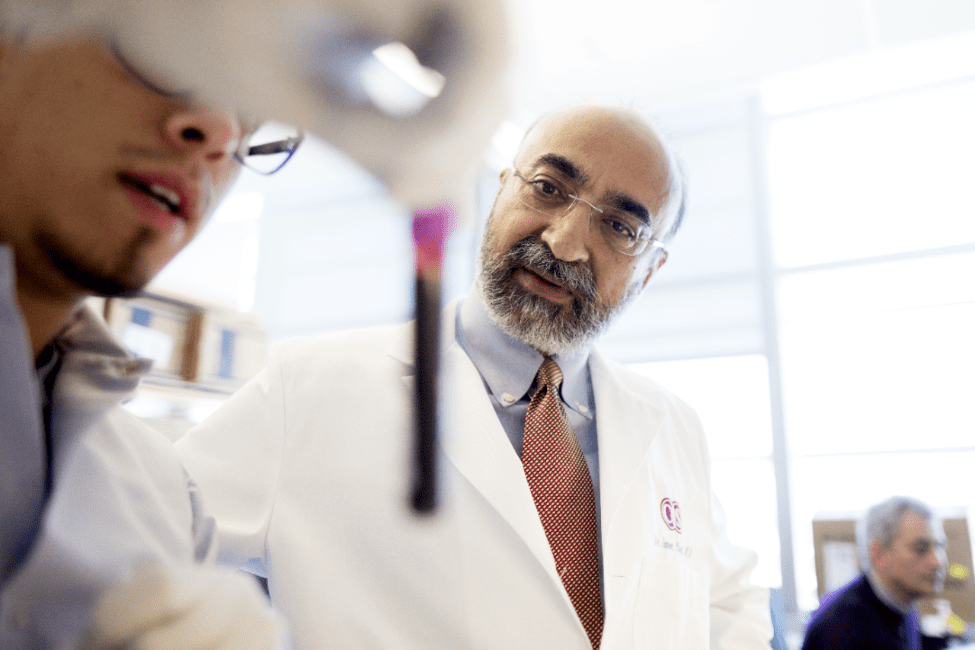Artificial Intelligence in Medicine
What is AI? The Department of Medicine at Cedars-Sinai has established a new division to explore how artificial intelligence (Ai) can be applied to help solve complex medical problems and enhance clinical care.
The new division, Artificial Intelligence in Medicine, or AIM, is led by Sumeet Chugh, MD, an associate director of the Smidt Heart Institute and a prominent expert in sudden cardiac arrest, who has long relied on technology and population-wide data to help demystify who might be susceptible to the usually fatal heart rhythm disturbance.
“Through the use of applied artificial intelligence, we can solve existing gaps in mechanisms, diagnostics and therapeutics of major human disease conditions which afflict large populations,” said Paul Noble, MD, professor of Medicine and Chair of the Department of Medicine, who created the new division. “The future of medicine lies in decoding enormous amounts of phenotypic and genotypic patient data.”
In conjunction with AIM, Cedars-Sinai has developed several key programs in which artificial intelligence is being increasingly deployed. Jason H. Moore, PhD, was recently named founding chair of the newly created Department of Computational Biomedicine-a systemwide program committed to advancing medical discoveries through interfacing the data sciences with clinical information.
Furthermore, Cedars-Sinai’s Enterprise Data Intelligence team, led by Mike Thompson, has a substantial track record of using AI tools to facilitate patient care at the hospital level–a particularly valuable resource that enabled outstanding care during the pandemic.
“Dr. Chugh has extensive experience using artificial intelligence to solve clinical problems for sudden cardiac arrest, one of our most difficult conditions,” said Shlomo Melmed, MB, ChB, executive vice president of Academic Affairs and dean of the Medical Faculty at Cedars-Sinai. “Under his leadership, the new division will harness the Cedars-Sinai systemwide clinical data warehouse to design clinically relevant approaches to solving important health questions.”
Chugh said AIM has a multidisciplinary mandate. With its current focus on cardiac imaging, sudden cardiac arrest, COVID-19 and clinical genetics, Chugh hopes that division members will tackle a broad range of medical, surgical and public health problems.
“Using a disease-based approach, AIM will enable cross-disciplinary connections between clinicians, scientists, and trainees at Cedars-Sinai at multiple levels,” said Chugh.
Artificial Intelligence in Medicine In Action
In practice, AIM recently published a study in the Journal of Nuclear Medicine, employing artificial intelligence algorithms to identify heart attack risk in patients with already established coronary artery disease.
“Because the actual risk for recurring heart attacks differs greatly among patients, predicting future risk in patients with existing coronary artery disease can be challenging,” said Piotr Slomka, PhD, professor of medicine in the Division of Artificial Intelligence in Medicine, and lead author of the study. “Predicting risk, however, becomes easier and more efficient with the use of artificial intelligence.”
New research, from the division of AIM, was also recently published in the journal JAMA Cardiology. In the study, physician-scientists created an artificial intelligence tool that can effectively identify and distinguish between two life-threatening heart conditions that are often easy to miss: hypertrophic cardiomyopathy and cardiac amyloidosis.
“These two heart conditions are challenging for even expert cardiologists to accurately identify, and so patients often go on for years to decades before receiving a correct diagnosis,” said David Ouyang, MD, a cardiologist in the Smidt Heart Institute, member of the division of AIM, and senior author of the study. “Our AI algorithm can pinpoint disease patterns that can’t be seen by the naked eye, and then use these patterns to predict the right diagnosis.”
As the new division advances, Chugh and team are designing clinically relevant questions from the broader Cedars-Sinai Health System that can be ethically vetted, analyzed, validated, and implemented.
“We hope to function as innovators and custodians of patients’ healthcare interests and needs,” said Chugh, the Pauline and Harold Price Chair in Cardiac Electrophysiology Research. “And, most important, we are bringing discoveries directly to patient care.”

